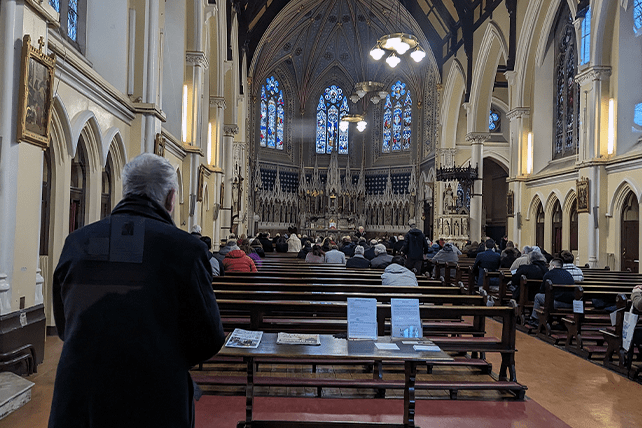DUBLIN (RNS) — At a Mass said in Latin on Sunday (March 10), Ireland’s traditional Catholics declared political victory, days after a pair of referendums aimed at secularizing the Irish Constitution were unexpectedly and resoundingly defeated.
On Friday, the Irish government put two measures to a vote that would have extended the rights of unmarried couples in the country’s constitution and removed language defining women’s roles “within the home.” Both had been widely expected to pass despite enjoying little debate in the Dail, or Irish parliament, and after a rubber stamp by all three of the Irish Republic’s main political parties.
Both proposals failed, even in progressive Dublin. When all votes were counted, 67.7% of voters had rejected the family amendment, while 73.9% rejected the measure dealing with women’s roles, referred to as the care amendment. Turnout was 44.4%.
On Sunday, as pundits and reporters struggled to explain the most strongly rejected referendum in the republic’s history, roughly 200 traditional Catholics, many in their 30s and 40s, gathered at St. Kevin’s Church, Harrington Street, one of the few places in the city where the traditional, pre-Vatican II Latin Mass is still celebrated, for a triumphant celebration and a redoubt of conservative Catholics.
Even as a much smaller crowd arrived for the noon English-language Mass, those who had attended the 10:30 a.m. Latin Mass — men in tweed jackets and women in long skirts and white, floral head coverings — packed into the tight parish hall for tea, still buzzing with delight at the vote.
The Latin Mass was largely done away with by the Second Vatican Council, when bishops meeting in Rome from 1962-1965 instituted Masses in local languages. However, some traditional Catholics remain drawn to the old Latin rite that dates to the 1500s.
That rite, which was allowed to be said more widely under Pope Benedict XVI, has become a flashpoint under Pope Francis, who in 2021 barred priests from saying it without permission from their bishops. Traditionalists have seen it as a symbol of the larger battle in the church over matters such as LGBT inclusion and the roles of women.
This divide was on display at the entrance to St. Kevin’s, in copies of Catholic Voice, a traditionalist newspaper whose latest issue looks forward to St. Patrick’s Day on March 17 while urging Irish Catholics to have the “courage” to declare that “liberalism is a sin” and deriding the “myths created by the homosexualist movement.” In a time when the pope is allowing priests to bless people in LGBTQ unions, the paper maintained that those who do not oppose “disordered sexuality” are “straddling Satan’s fence.”
The message that Catholic values are under threat from within the church has hit home in Ireland, where society was overwhelmingly Catholic a generation ago. As of 2022, Catholics made up just 69% of the population, down sharply from 79% in 2016. Weekly Mass attendance among Catholics hovers around one-third nationally, down from over 90% in the 1970s.
Accompanying this transformation have been referendums in which the Irish have legalized divorce (1995), gay marriage (2015) and abortion (2018).
But references to both marriage as a fundamental societal unit and to the roles of women in the home will now stay in the constitution. “It’s a great result for women, for mothers, for the homes and for marriage,” said Maria Steen, a prominent conservative activist. “And I think it’s a real rejection of the government’s attempt to, you know, delete all of that from the constitution.”
Steen ran a brief campaign that framed the removal of motherhood from the constitution as both sexist and anti-Catholic. She said Friday’s election result was a sign that the Irish had “gratitude” for motherhood.

